When Michael Gude started searching for an internship in finance in August of 2016, he was optimistic that he would find plenty of opportunities to consider for the following summer. Fast-forward to the spring of 2017, and the finance major was feeling a little less enthused. It had been a long hunt for the right internship, and he was still waiting to hear whether he would be able to take advantage of one of the two internships he had found.
“It took far too long and far too much time to find the right opportunity for me,” says Gude, noting his internship search finally ended in April when he committed to an investments internship with Sompo International in New York City. “It’s such a painful, stressful process. It took my mind off school work and campus involvement. It’s something that needs to be addressed.”
Gude, a rising senior, and Hassam Solano-Morel ’17, who graduated in May with a degree in computer science, are gearing up to launch a solution that aims to streamline students’ search for internships and better connect them with businesses searching for student talent.
Gude and Solano-Morel have developed a new app called Experiential Learning Analytics Powered (ELAP for short) as part of their work in the College’s ICAT (Interdisciplinary Center for Applied Technology) spring 2017 cohort. The ICAT program offers students the opportunity to solve real-world problems in the market place through technological, entrepreneurial and creative activities.
 “The current problem is that when a student goes to try to find these opportunities they’re spending hours on end just trying to find a good website or typing in the right key words to find these opportunities and that just takes too long,” says Solano-Morel.
“The current problem is that when a student goes to try to find these opportunities they’re spending hours on end just trying to find a good website or typing in the right key words to find these opportunities and that just takes too long,” says Solano-Morel.
What makes ELAP different from a traditional Google search is its use of machine learning for natural language understanding (think AI), which allows the app to extract meaning from a short paragraph highlighting students’ interests, previous work or internship experience, what he or she is studying, and what kind of experience they’re looking for. The app then takes that information and combs its database for potential matches.
“It’s not your traditional key word search,” says Solano-Morel. “It’s really searching by the meaning of what you’re telling it.”
Gude adds, “It’s really tailoring the fit. It goes way beyond a Google search. You’re going deeper into what the person is saying.”
ELAP is a great demonstration of what the ICAT program helps students achieve, says Chris Starr, associate professor of information management and director of the ICAT program. Although Solano-Morel’s and Gude’s ELAP app came in fourth during ICAT’s annual Demo Day pitch competition in April, Starr says the app has a lot of potential, particularly in the world of higher education.
“We need to move experiential learning from the margins where just a few people have these experiences to the middle where it is driving students’ learning and skills,” says Starr.
An app like ELAP, says Starr, can improve students’ access to meaningful, real-world activities whether that’s publishing research with a professor, studying historic preservation in Europe or getting a competitive internship at a financial firm.
“It’s the difference between going to work at Boeing and observing the workers working at Boeing,” he says.
Solano-Morel and Gude have begun beta tests of the ELAP platform and are working toward having the app available for CofC students before the end of the fall semester. They plan to eventually expand the app to connect students with research and study abroad opportunities as well. And the ambitious budding entrepreneurs hope to one day see their app implemented at colleges and universities across the country.
“Students can do great in the classroom, but the skills they need are out there in the world and we want to help them gain those skills before they get out into the job market,” Solano-Morel says.




